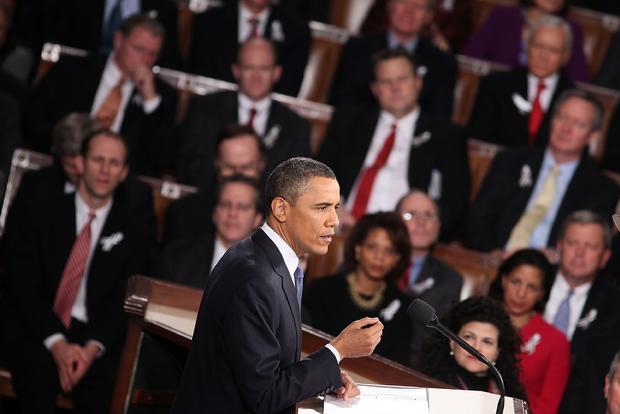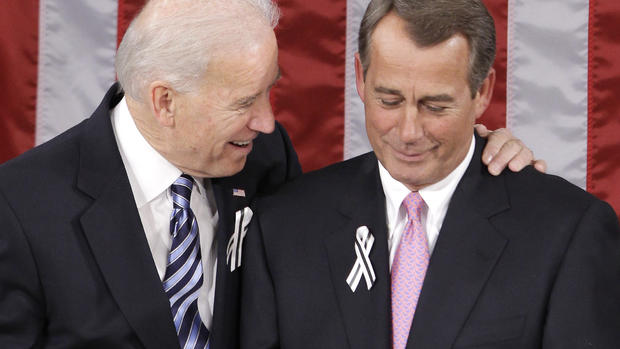What Obama's New Slogan Means for America
This post originally appeared on Slate.
"Win the future." That was President Obama's slogan for his State of the Union address, in which he used the phrase (or a variant) 11 times. Not only is Obama courting American business, he's using tag lines from corporate marketing. But as the president spoke, the line sounded more like the title of a self-help seminar, with Obama in the role of Tony Robbins.
Obama: "The Future is Ours to Win"He described a challenge to the American dream: The promise of prosperity is threatened by technology and global competition. His pitch was aimed at those Americans "who feel like the rules have been changed in the middle of the game." After sketching this moment of uncertainty, he quickly moved to optimism, rallying the country to its strongest traditions of perseverance and affirming that Americans have always been able to shape their own destiny. His speech was practically a 12-step program for reconnecting the American people with the dream that animated the country at its beginning.
The heart of the plan was a call for investment in education, infrastructure, and energy independence. Republicans had complained before the speech that this was more of the same old Democratic deficit spending. Obama tried to pitch a more precise vision of spending, one in which government nudged investment rather than picking winners and losers in industry. He said he wanted to "spark" innovation. He wanted to encourage states to come up with programs to improve education and tempt companies to compete for federal dollars by coming up with innovative ideas. "We're not just handing out money. We're issuing a challenge," he said.
State of the Union: Full Obama Speech TextThe idea is to create incentives, not issue regulations, and in so doing win the support of--or least fail to be opposed by--business groups like the U.S. Chamber of Commerce. For a president who will be judged on his ability to lower the unemployment rate, the hope is that business will hear the message in this speech and spend some of the cash that they've been accumulating knowing that the environment has improved. As another sign of the president's increasingly warm feeling about American business, he included none of the swipes at Wall Street or banks that were in the last State of the Union or his speech to Congress shortly after he took office.
(Watch video of Katie Couric and John Dickerson discussing Rep. Michele Bachmann's Tea Party response to the President's speech at left.)
The political hope is that the Americans will hear this speech or hear about it and conclude that the president is thoroughly focused on the economy. It was an opening gambit in a two-year debate with Republicans about what government should do: How big it should be. What it does well and what it doesn't. How to set its priorities. (In a sense that also made it a 2012 campaign speech.)
Obama's argument is that there should be balance--smart investment and deficit reduction. Republicans want this debate to be measured by a single number--the amount by which the budget deficit is reduced. By reducing government spending and onerous regulations, the theory goes, you unleash the wisdom of the private sector, which then directs investment into activities that make the country more productive.
If the competition with Republicans is about who can cut more spending, Obama is never going to win. He didn't try. He offered a five-year spending freeze for discretionary, non-defense, non-entitlement spending, a small portion of the federal budget. This was a more modest proposal than the one offered by his deficit commission (which he seems ready to ignore).
State of the Union Shuffle: The Powerful go to Prom"Prom" during State of the Union
This Is Our 'Sputnik Moment'
The budget problem can't be fixed with cuts alone, but investment led growth of the kind the president is hoping for isn't going to do it either. The president acknowledged that to seriously attack the deficit, both parties would have to find a way to cut entitlements, but he didn't offer a suggestion. "We do big things," he said of America. But apparently not when it comes to the deficit. At least not in this speech. "It was depressingly vague," said Maya MacGuineas of the Center for a Responsible Budget. "If the president is going to spend some of his political capital on this issue, we may well run out of time before we turn this situation around."
But there are advantages to the president's approach. If he'd announced a big plan for cuts, that would have been the story coming out of the speech. It would have muddled his message of uplift. Also, whatever budget cuts the president really thinks are sensible, as a negotiating tactic it would be wise to announce a smaller target so that he can have something to negotiate with in the coming battle with Republicans. Just as he ultimately gave in and allowed the Bush tax cuts to be extended for the most wealthy in order to get a second round of stimulus spending, perhaps he'll give in on more spending reductions to get more of the spending he wants.
This was the president's most sustained pitch for a government equal to the spirit of the American people and history, but it wasn't the first. In his last State of the Union he cited the Civil War and World War II in calling for another dose of determination and grit. This time he said America faced another Sputnik moment. He was referring to the Soviet Union's satellite launch that spurred the creation of NASA. The problem with this analogy, aside from those that my colleague Fred Kaplan points out, is that the stakes aren't as high. The Soviets were first in space, which meant they were getting better at the technology that one day might be used in weapons that could destroy us. People don't feel that way about China, at least not yet. The analogy may also have been lost on those who did not experience that period in American history. Fortunately for the president, his analogy about the past wasn't crucial to his vision for the future.
More from Slate:
Obama's "Sputnik Moment"
Senate filibuster reform yields to stupid bipartisan pantomime.
The GOP's budget proposal is a preposterous, dangerous fantasy.
John Dickerson is a CBS News political analyst. He is also Slate's chief political correspondent and author of On Her Trail. You can also follow him on Twitter here.


